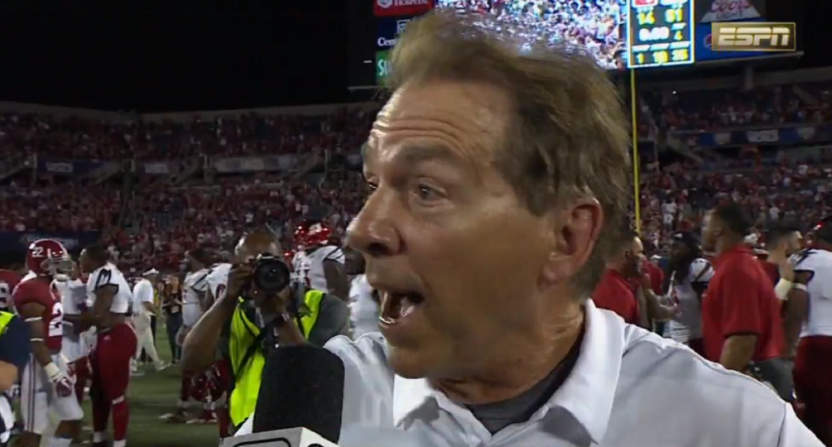The relationships between media outlets and particular NCAA schools are always notable to watch, showing up in everything from scheduling to on-air and off-air comments from executives and personalities to access restrictions to debates about business interests and coverage. AL.com’s Rainer Sabin has an interesting piece exploring how ESPN’s relationship with Alabama has changed over the years, from a school that saw two games on pay-per-view in 2002 to a school featured in marquee slots (many of them on ESPN networks) pretty much every week today (as well as one constantly discussed on ESPN studio programming) thanks to their success under Nick Saban.
The piece has several ESPN executives and college football commentators talking about how and why they cover the Tide, and their comments are worth a read, but there’s nothing too notable on that front. Of course ESPN’s going to heavily cover a team that’s won five national championships inside the last decade, that’s usually ranked #1, and that’s made the College Football Playoff in each year of its existence, to say nothing of a team that regularly produces some of the best college football ratings. Some may take that as a reason to cry “Conspiracy!” (ESPN has a big SEC deal and operates the SEC Network, of course), and there’s maybe an argument that ESPN has at times given more hype to Alabama than they should (perhaps particularly including last year’s high-profile interviews with Saban where he openly lobbied for a playoff berth).
However, it’s not hard to see ESPN providing reasonably similar coverage for any team that produced these kind of results, regardless of business relationships. It’s notable that even Fox, a network with no SEC rights at all, spends plenty of time hyping up Alabama; despite occasional ridiculous takes that Jim Harbaugh’s a better coach than Saban, FS1 certainly doesn’t ignore the Tide, and they’re generally quite positive about them. And there aren’t any smoking guns of ESPN favoritism in this piece; Alabama wins and creates conversation, so ESPN’s going to show them and talk about them. What is particularly notable in Sabin’s piece is the discussion of how this relationship has changed on Saban’s side, though.
Despite a wariness of the media and the “rat poison” they supply, Saban has embraced ESPN.
“They have given us a very fair shake in everything that we’ve done,” Saban said.
It’s pretty rare to hear Saban with those kinds of comments about any media outlet, and it’s highly notable that his behavior towards ESPN has both shifted from what it used to be and continues to differ from his behavior towards other media outlets. First, there’s the preseason ESPN+ series on Alabama training camp; as per Sabin’s piece, the Tide had done something similar in 2010 but had turned ESPN down more recently, but chose to go with them this year as part of an effort to show off “the softer side” of the program (and regain some recruiting momentum against other teams like Georgia). There are probably a million things the notoriously-secretive Saban would rather do than have extra cameras around his team, but he clearly understands the value of increased exposure for his program’s brand (see the infamous barbershop show), and is now more willing to deal with it occasionally.
Similarly, there’s Saban’s apology in the wake of a rude on-camera response to ESPN’s Maria Taylor. Yes, it’s possible that Saban might have apologized to anyone eventually, especially considering the firestorm that interview sparked, but it seems probable that the apology came quicker (later that night), saw him call Taylor directly, and was more detailed because it was ESPN involved. Saban can afford to be seen as rude (and he often is) in regular press conferences and remarks to local reporters, because he doesn’t need them as much, but at least these days, he does seem to place a higher value on maintaining a good relationship with ESPN.
The latest
And maybe that’s a valuable thing for college coaches in general to realize. Yes, it’s easy to get upset at reporters or personalities over particular stories or comments, but ultimately, media coverage can be a heck of a recruiting tool. And trying to lock it down never seems to work out too well in the end, as Mike Gundy’s finding out this week. Some coaches, like Navy’s Ken Niumatalolo, have found success going the other way and being open with the media to an even greater extent.
It’s also worth noting that good relationships with ESPN in particular can lead to more visibility, such as guest analyst spots during Megacasts, and even to analyst jobs after coaching in some cases. There are good reasons for coaches not to be a jerk to the media in general, and not to be a jerk to ESPN in particular. And Saban, one of the most-dominant but also most-prickly coaches out there, appears to be coming to that conclusion.
[AL.com]







